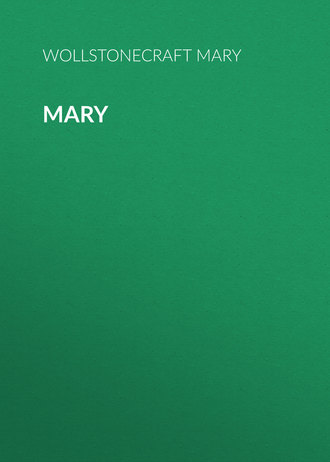
Wollstonecraft Mary
Mary
CHAP. XXV
A few mornings after, as Mary was sitting ruminating, harassed by perplexing thoughts, and fears, a letter was delivered to her: the servant waited for an answer. Her heart palpitated; it was from Henry; she held it some time in her hand, then tore it open; it was not a long one; and only contained an account of a relapse, which prevented his sailing in the first packet, as he had intended. Some tender enquiries were added, concerning her health, and state of mind; but they were expressed in rather a formal style: it vexed her, and the more so, as it stopped the current of affection, which the account of his arrival and illness had made flow to her heart—it ceased to beat for a moment—she read the passage over again; but could not tell what she was hurt by—only that it did not answer the expectations of her affection. She wrote a laconic, incoherent note in return, allowing him to call on her the next day—he had requested permission at the conclusion of his letter.
Her mind was then painfully active; she could not read or walk; she tried to fly from herself, to forget the long hours that were yet to run before to-morrow could arrive: she knew not what time he would come; certainly in the morning, she concluded; the morning then was anxiously wished for; and every wish produced a sigh, that arose from expectation on the stretch, damped by fear and vain regret.
To beguile the tedious time, Henry's favorite tunes were sung; the books they read together turned over; and the short epistle read at least a hundred times.—Any one who had seen her, would have supposed that she was trying to decypher Chinese characters.
After a sleepless night, she hailed the tardy day, watched the rising sun, and then listened for every footstep, and started if she heard the street door opened. At last he came, and she who had been counting the hours, and doubting whether the earth moved, would gladly have escaped the approaching interview.
With an unequal, irresolute pace, she went to meet him; but when she beheld his emaciated countenance, all the tenderness, which the formality of his letter had damped, returned, and a mournful presentiment stilled the internal conflict. She caught his hand, and looking wistfully at him, exclaimed, "Indeed, you are not well!"
"I am very far from well; but it matters not," added he with a smile of resignation; "my native air may work wonders, and besides, my mother is a tender nurse, and I shall sometimes see thee."
Mary felt for the first time in her life, envy; she wished involuntarily, that all the comfort he received should be from her. She enquired about the symptoms of his disorder; and heard that he had been very ill; she hastily drove away the fears, that former dear bought experience suggested: and again and again did she repeat, that she was sure he would soon recover. She would then look in his face, to see if he assented, and ask more questions to the same purport. She tried to avoid speaking of herself, and Henry left her, with, a promise of visiting her the next day.
Her mind was now engrossed by one fear—yet she would not allow herself to think that she feared an event she could not name. She still saw his pale face; the sound of his voice still vibrated on her ears; she tried to retain it; she listened, looked round, wept, and prayed.
Henry had enlightened the desolate scene: was this charm of life to fade away, and, like the baseless fabric of a vision, leave not a wreck behind? These thoughts disturbed her reason, she shook her head, as if to drive them out of it; a weight, a heavy one, was on her heart; all was not well there.
Out of this reverie she was soon woke to keener anguish, by the arrival of a letter from her husband; it came to Lisbon after her departure: Henry had forwarded it to her, but did not choose to deliver it himself, for a very obvious reason; it might have produced a conversation he wished for some time to avoid; and his precaution took its rise almost equally from benevolence and love.
She could not muster up sufficient resolution to break the seal: her fears were not prophetic, for the contents gave her comfort. He informed her that he intended prolonging his tour, as he was now his own master, and wished to remain some time on the continent, and in particular to visit Italy without any restraint: but his reasons for it appeared childish; it was not to cultivate his taste, or tread on classic ground, where poets and philosophers caught their lore; but to join in the masquerades, and such burlesque amusements.
These instances of folly relieved Mary, in some degree reconciled her to herself added fuel to the devouring flame—and silenced something like a pang, which reason and conscience made her feel, when she reflected, that it is the office of Religion to reconcile us to the seemingly hard dispensations of providence; and that no inclination, however strong, should oblige us to desert the post assigned us, or force us to forget that virtue should be an active principle; and that the most desirable station, is the one that exercises our faculties, refines our affections, and enables us to be useful.
One reflection continually wounded her repose; she feared not poverty; her wants were few; but in giving up a fortune, she gave up the power of comforting the miserable, and making the sad heart sing for joy.
Heaven had endowed her with uncommon humanity, to render her one of His benevolent agents, a messenger of peace; and should she attend to her own inclinations?
These suggestions, though they could not subdue a violent passion, increased her misery. One moment she was a heroine, half determined to bear whatever fate should inflict; the next, her mind would recoil—and tenderness possessed her whole soul. Some instances of Henry's affection, his worth and genius, were remembered: and the earth was only a vale of tears, because he was not to sojourn with her.
CHAP. XXVI
Henry came the next day, and once or twice in the course of the following week; but still Mary kept up some little formality, a certain consciousness restrained her; and Henry did not enter on the subject which he found she wished to avoid. In the course of conversation, however, she mentioned to him, that she earnestly desired to obtain a place in one of the public offices for Ann's brother, as the family were again in a declining way.
Henry attended, made a few enquiries, and dropped the subject; but the following week, she heard him enter with unusual haste; it was to inform her, that he had made interest with a person of some consequence, whom he had once obliged in a very disagreeable exigency, in a foreign country; and that he had procured a place for her friend, which would infallibly lead to something better, if he behaved with propriety. Mary could not speak to thank him; emotions of gratitude and love suffused her face; her blood eloquently spoke. She delighted to receive benefits through the medium of her fellow creatures; but to receive them from Henry was exquisite pleasure.
As the summer advanced, Henry grew worse; the closeness of the air, in the metropolis, affected his breath; and his mother insisted on his fixing on some place in the country, where she would accompany him. He could not think of going far off, but chose a little village on the banks of the Thames, near Mary's dwelling: he then introduced her to his mother.
They frequently went down the river in a boat; Henry would take his violin, and Mary would sometimes sing, or read, to them. She pleased his mother; she inchanted him. It was an advantage to Mary that friendship first possessed her heart; it opened it to all the softer sentiments of humanity:—and when this first affection was torn away, a similar one sprung up, with a still tenderer sentiment added to it.
The last evening they were on the water, the clouds grew suddenly black, and broke in violent showers, which interrupted the solemn stillness that had prevailed previous to it. The thunder roared; and the oars plying quickly, in order to reach the shore, occasioned a not unpleasing sound. Mary drew still nearer Henry; she wished to have sought with him a watry grave; to have escaped the horror of surviving him.—She spoke not, but Henry saw the workings of her mind—he felt them; threw his arm round her waist—and they enjoyed the luxury of wretchedness.—As they touched the shore, Mary perceived that Henry was wet; with eager anxiety she cried, What shall I do!—this day will kill thee, and I shall not die with thee!
This accident put a stop to their pleasurable excursions; it had injured him, and brought on the spitting of blood he was subject to—perhaps it was not the cold that he caught, that occasioned it. In vain did Mary try to shut her eyes; her fate pursued her! Henry every day grew worse and worse.
CHAP. XXVII
Oppressed by her foreboding fears, her sore mind was hurt by new instances of ingratitude: disgusted with the family, whose misfortunes had often disturbed her repose, and lost in anticipated sorrow, she rambled she knew not where; when turning down a shady walk, she discovered her feet had taken the path they delighted to tread. She saw Henry sitting in his garden alone; he quickly opened the garden-gate, and she sat down by him.
"I did not," said he, "expect to see thee this evening, my dearest Mary; but I was thinking of thee. Heaven has endowed thee with an uncommon portion of fortitude, to support one of the most affectionate hearts in the world. This is not a time for disguise; I know I am dear to thee—and my affection for thee is twisted with every fibre of my heart.—I loved thee ever since I have been acquainted with thine: thou art the being my fancy has delighted to form; but which I imagined existed only there! In a little while the shades of death will encompass me—ill-fated love perhaps added strength to my disease, and smoothed the rugged path. Try, my love, to fulfil thy destined course—try to add to thy other virtues patience. I could have wished, for thy sake, that we could have died together—or that I could live to shield thee from the assaults of an unfeeling world! Could I but offer thee an asylum in these arms—a faithful bosom, in which thou couldst repose all thy griefs—" He pressed her to it, and she returned the pressure—he felt her throbbing heart. A mournful silence ensued! when he resumed the conversation. "I wished to prepare thee for the blow—too surely do I feel that it will not be long delayed! The passion I have nursed is so pure, that death cannot extinguish it—or tear away the impression thy virtues have made on my soul. I would fain comfort thee—"
"Talk not of comfort," interrupted Mary, "it will be in heaven with thee and Ann—while I shall remain on earth the veriest wretch!"—She grasped his hand.
"There we shall meet, my love, my Mary, in our Father's—" His voice faultered; he could not finish the sentence; he was almost suffocated—they both wept, their tears relieved them; they walked slowly to the garden-gate (Mary would not go into the house); they could not say farewel when they reached it—and Mary hurried down the lane; to spare Henry the pain of witnessing her emotions.
When she lost sight of the house she sat down on the ground, till it grew late, thinking of all that had passed. Full of these thoughts, she crept along, regardless of the descending rain; when lifting up her eyes to heaven, and then turning them wildly on the prospects around, without marking them; she only felt that the scene accorded with her present state of mind. It was the last glimmering of twilight, with a full moon, over which clouds continually flitted. Where am I wandering, God of Mercy! she thought; she alluded to the wanderings of her mind. In what a labyrinth am I lost! What miseries have I already encountered—and what a number lie still before me.
Her thoughts flew rapidly to something. I could be happy listening to him, soothing his cares.—Would he not smile upon me—call me his own Mary? I am not his—said she with fierceness—I am a wretch! and she heaved a sigh that almost broke her heart, while the big tears rolled down her burning cheeks; but still her exercised mind, accustomed to think, began to observe its operation, though the barrier of reason was almost carried away, and all the faculties not restrained by her, were running into confusion. Wherefore am I made thus? Vain are my efforts—I cannot live without loving—and love leads to madness.—Yet I will not weep; and her eyes were now fixed by despair, dry and motionless; and then quickly whirled about with a look of distraction.
She looked for hope; but found none—all was troubled waters.—No where could she find rest. I have already paced to and fro in the earth; it is not my abiding place—may I not too go home! Ah! no. Is this complying with my Henry's request, could a spirit thus disengaged expect to associate with his? Tears of tenderness strayed down her relaxed countenance, and her softened heart heaved more regularly. She felt the rain, and turned to her solitary home.
Fatigued by the tumultuous emotions she had endured, when she entered the house she ran to her own room, sunk on the bed; and exhausted nature soon closed her eyes; but active fancy was still awake, and a thousand fearful dreams interrupted her slumbers.
Feverish and languid, she opened her eyes, and saw the unwelcome sun dart his rays through a window, the curtains of which she had forgotten to draw. The dew hung on the adjacent trees, and added to the lustre; the little robin began his song, and distant birds joined. She looked; her countenance was still vacant—her sensibility was absorbed by one object.
Did I ever admire the rising sun, she slightly thought, turning from the Window, and shutting her eyes: she recalled to view the last night's scene. His faltering voice, lingering step, and the look of tender woe, were all graven on her heart; as were the words "Could these arms shield thee from sorrow—afford thee an asylum from an unfeeling world." The pressure to his bosom was not forgot. For a moment she was happy; but in a long-drawn sigh every delightful sensation evaporated. Soon—yes, very soon, will the grave again receive all I love! and the remnant of my days—she could not proceed—Were there then days to come after that?
CHAP. XXVIII
Just as she was going to quit her room, to visit Henry, his mother called on her.
"My son is worse to-day," said she, "I come to request you to spend not only this day, but a week or two with me.—Why should I conceal any thing from you? Last night my child made his mother his confident, and, in the anguish of his heart, requested me to be thy friend—when I shall be childless. I will not attempt to describe what I felt when he talked thus to me. If I am to lose the support of my age, and be again a widow—may I call her Child whom my Henry wishes me to adopt?"
This new instance of Henry's disinterested affection, Mary felt most forcibly; and striving to restrain the complicated emotions, and sooth the wretched mother, she almost fainted: when the unhappy parent forced tears from her, by saying, "I deserve this blow; my partial fondness made me neglect him, when most he wanted a mother's care; this neglect, perhaps, first injured his constitution: righteous Heaven has made my crime its own punishment; and now I am indeed a mother, I shall loss my child—my only child!"
When they were a little more composed they hastened to the invalide; but during the short ride, the mother related several instances of Henry's goodness of heart. Mary's tears were not those of unmixed anguish; the display of his virtues gave her extreme delight—yet human nature prevailed; she trembled to think they would soon unfold themselves in a more genial clime.
CHAP. XXIX
She found Henry very ill. The physician had some weeks before declared he never knew a person with a similar pulse recover. Henry was certain he could not live long; all the rest he could obtain, was procured by opiates. Mary now enjoyed the melancholy pleasure of nursing him, and softened by her tenderness the pains she could not remove. Every sigh did she stifle, every tear restrain, when he could see or hear them. She would boast of her resignation—yet catch eagerly at the least ray of hope. While he slept she would support his pillow, and rest her head where she could feel his breath. She loved him better than herself—she could not pray for his recovery; she could only say, The will of Heaven be done.
While she was in this state, she labored to acquire fortitude; but one tender look destroyed it all—she rather labored, indeed, to make him believe he was resigned, than really to be so.
She wished to receive the sacrament with him, as a bond of union which was to extend beyond the grave. She did so, and received comfort from it; she rose above her misery.
His end was now approaching. Mary sat on the side of the bed. His eyes appeared fixed—no longer agitated by passion, he only felt that it was a fearful thing to die. The soul retired to the citadel; but it was not now solely filled by the image of her who in silent despair watched for his last breath. Collected, a frightful calmness stilled every turbulent emotion.
The mother's grief was more audible. Henry had for some time only attended to Mary—Mary pitied the parent, whose stings of conscience increased her sorrow; she whispered him, "Thy mother weeps, disregarded by thee; oh! comfort her!—My mother, thy son blesses thee.—" The oppressed parent left the room. And Mary waited to see him die.
She pressed with trembling eagerness his parched lips—he opened his eyes again; the spreading film retired, and love returned them—he gave a look—it was never forgotten. My Mary, will you be comforted?
Yes, yes, she exclaimed in a firm voice; you go to be happy—I am not a complete wretch! The words almost choked her.
He was a long time silent; the opiate produced a kind of stupor. At last, in an agony, he cried, It is dark; I cannot see thee; raise me up. Where is Mary? did she not say she delighted to support me? let me die in her arms.
Her arms were opened to receive him; they trembled not. Again he was obliged to lie down, resting on her: as the agonies increased he leaned towards her: the soul seemed flying to her, as it escaped out of its prison. The breathing was interrupted; she heard distinctly the last sigh—and lifting up to Heaven her eyes, Father, receive his spirit, she calmly cried.
The attendants gathered round; she moved not, nor heard the clamor; the hand seemed yet to press hers; it still was warm. A ray of light from an opened window discovered the pale face.
She left the room, and retired to one very near it; and sitting down on the floor, fixed her eyes on the door of the apartment which contained the body. Every event of her life rushed across her mind with wonderful rapidity—yet all was still—fate had given the finishing stroke. She sat till midnight.—Then rose in a phrensy, went into the apartment, and desired those who watched the body to retire.
She knelt by the bed side;—an enthusiastic devotion overcame the dictates of despair.—She prayed most ardently to be supported, and dedicated herself to the service of that Being into whose hands, she had committed the spirit she almost adored—again—and again,—she prayed wildly—and fervently—but attempting to touch the lifeless hand—her head swum—she sunk—






